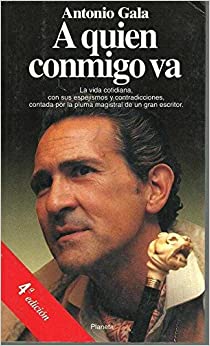Antonio Gala is a Spanish writer and educator. He is an original, and commercially successful playwright debunked historical myths while commenting on contemporary Spain via expressionistic humor and comedy. Antonio's psychological drama of the Spanish Civil War, La casa de las Chivas, holds Madrid box-office records.
Background
Antonio Gala was born on October 2, 1930, in Brazatortas, Spain. However, his place and date of birth are indicated differently in different sources. Antonio is the son of Luis Gala Calvo and Adoración Velasco. He spent his childhood in Cordoba.
Education
Antonio Gala studied at the Universidad de Seville, where he earned a law degree. Also, he advanced degrees in both political science and economics from Universidad de Madrid.
Career
A noted Spanish writer, who focuses on the history and landscape of his native Andalusia within his works, Antonio Gala is the author of several popular productions for stage and screen, as well as novels, poems, and essays. The future writer spent his childhood in Cordoba, where he began to write for the first time, around the age of 14.
In the late 1950s, Antonio Gala was a bricklayer's assistant. After graduating, he first began to work as a state attorney, but quickly left this position, quarreling with his parents, and entered the monastic order of the Cartesians. However, a strict monastic charter was not for him, and soon he was expelled. After that, Antonio Gala moves to Portugal. It was in Portugal that he began his successful theatrical career, which already in 1963 allowed him to live solely on the work that he wrote. As a creator, Antonio will be successful in all areas: theater, fiction, and poetry. He had become a famous playwright, capturing the interest and enthusiasm of his audience.
Since beginning his career in the Madrid theater in the early 1960s, Antonio Gala has produced both musicals and dramas and has incorporated folkloric, historical, and allegorical elements into his plots. He has produced three lavish musicals, Carmen Carmen, Cristóbal Colón, and La truhana, all period pieces employing extensive sets and costumes, choreography, and a lush musical score. He also incorporates humor within his stage works.
In addition to musicals, Antonio Gala has also produced dramatic plays, such as the highly lauded Los Buenos días perdidos and 1973's Anillos para una dama. First recorded in the twelfth-century Poema de Mio Cid, the legend of Cid focuses on a Christian knight, loyal to Spain, who risks all for king and country. In his play, Antonio focuses, not on Cid himself, but the wife, Jimen, that he leaves behind at his death. Antonio attained the popularity early in his career as a result of his television series Paisaje configures, which ceased broadcasting in 1976 upon orders of Spanish President Arias Navarro. Antonio Gala's first full-length novel, El manuscrito carmesí, is a work of historical fiction that focuses on the recapture of Spain from the Ottoman Turks in the late fifteenth century by presenting the fictional journal of Boabdil, the last sultan of Granada.
Besides, Antonio Gala is an educator. Since 1959 he has been teaching philosophy and history of art. Antonio Gala is currently a president of the International Theatre Institute, works in the newspaper El Mundo since 1992, and rarely writes books. He has also founded a fund, Antonio Gala Foundation, for young talents. This fund provides scholarships and strongly supports aspiring artists.
Politics
In 1976 to the early 1980s, when it was the period of the Spanish transition to democracy, Antonio Gala supported the leftist political view. In 1978 he urged for a statute of autonomy for Andalusia. However, Antonio wasn't a supporter of a specific political party.
Views
Quotations:
"Making someone happy is perhaps the humblest way of approaching happiness."
"Love is the poetry of our feelings. But there are some horrible poems."
"I am not a pessimist. Just a well informed optimist."
Personality
Physical Characteristics:
In the 1960s, Antonio Gala became seriously ill and almost died. Later, recovering, he will begin to use a cane, which will soon become his characteristic sign.
















































































